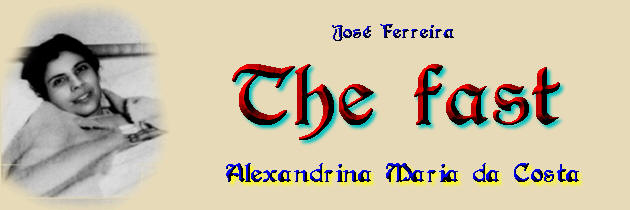THE FAST
The subject of Alexandrina’s fast challenges our thinking that values the objective and indisputable fact.
Therefore it is particularly provocative: it is extraordinary, but true. The documents we publish here are intended to endorse the truth of the claims.
For other important aspects concerning the fast, the reader might consult Only for Love!, available on the Official Website (in English).
ALEXANDRINA IN THE JOURNALS OF HER TIME
ALEXANDRINA IN THE JOURNALS OF HER TIME
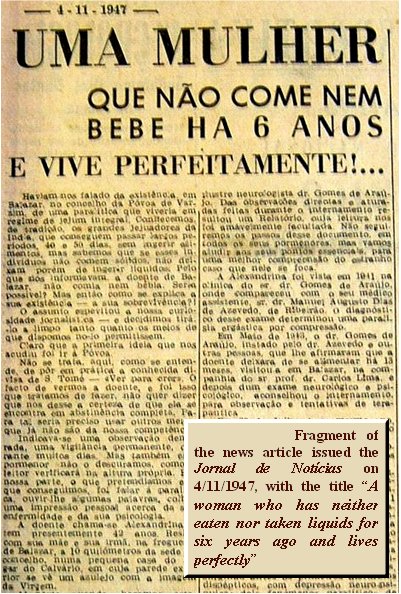 Alexandrina’s
name appears for the first time in the press in 1941, written by Fr José Alves
Terças, in an article on “A Martirizada do Calvário” (The Martyr of Calvary).
Alexandrina’s
name appears for the first time in the press in 1941, written by Fr José Alves
Terças, in an article on “A Martirizada do Calvário” (The Martyr of Calvary).
In mid-1944, her name became widely known with the issue of the unfortunate note from the Curia of Braga, in which it was denied that there was anything extraordinary, that is, supernatural, in what concerned the “martyr”.
In January 1947, an unseemly allusion to Alexandrina in an article of Fr José Agostinho Veloso issued in the Brotéria, with the heading,“Mystics and Journalism”, moved Dr Azevedo to reply in O Comércio do Porto, in February, under the heading of “Reply to a phrase in the magazine “Brotéria””.
At the end of the year, on 4th November, the Jornal do Notícias published a news article on Alexandrina; the heading was provocative: “Uma mulher que não come nem bebe há seis anos e vive perfeitamente” (A woman who has neither eaten nor taken liquids for six years ago and lives perfectly). It carries no by-line but the work is certainly the responsibility of the diary’s director; it includes a brief interview and a photograph of the exterior of the house. The author adopts a respectful attitude, although he shows a certain reserve, probably to save his own face should he stir up opposition.
Let’s read the charming portrait that he presents of the Patient of Calvary:
Alexandrina, with an open smile, is perhaps waiting until we speak to her. Her face is a little long, the mouth is uneven, the skin pale with a touch of pink. Her eyes are black, and brilliant with light; the hair, which is also black, frames her expression of unaffected sympathy. She is 43 years old, but does not appear to be more than 33.
And now the interview:
- We were told that you do not take food.
- That is true. I stopped eating and drinking six years ago.
- But you have no appetite?
- I always feel sated.
- Do you have a distaste for food?
- No. I sometimes long for it.
- Then why don’t you use those occasions to try a quick snack?
- I cannot. I feel too well.
- How do you mean, well?
- It is a way of speaking: I feel well, I feel poorly.
- For how long have you been ill?
- Thirty years. Only 13 ago I had had first the great crisis. That time, tortured by vomiting, I underwent a fast of 17 days. Later came other crises, less drawn out. When they passed, I ate again. Finally, I ate almost only fruit. But six years ago came the definitive crisis. Then I left off food completely.
- There is nothing about your appearance that would indicate this.
- Each one knows himself. I understand that my illness has roused curiosity and talk. It troubles me that such things should happen. I wish people wouldn’t concern themselves about me. Too much has already been said. If it was in my power, I would hide myself in a hole.
Yet Alexandrina speaks without any sign of annoyance – she speaks naturally, saying what she feels. This simplicity is transparent. She suffers, certainly, but she endures with joy, armed with a determined spiritual force, her faith.
We continue with the interrogation:
- And the doctors?
- The doctors – they do not say anything. Every week Dr Azevedo comes here, but he does not prescribe remedies for me. Five years ago I was in a hospital in Porto. They I underwent 40 days of constant, rigorous monitoring. But I returned from there just as I had entered.
Half hour had passed. The patient was visibly tired. We made our farewells, expressing wish for her improvement. Smiling, she thanked us.
Let us move to the conclusion of the article:
In spite of the understandable loss of weight, (Alexandrina) maintains an impressive freshness and resilience. Finally, hers is a case that Medicine, to a large extent, can explain, but it does leave some details unclear because food is important to the biological process. Such a length of time without liquids and anury should impose certain suspensions. Medicine needs to give a clear explanation and provide more light on such happenings. However, science is not definitive, as we know. What is undisputed is the fact that the patient has lived for years without taking anything by mouth, neither food nor drink.
The following week, Dr Dias de Azevedo published, in the same periodical and under the same heading, a long clarification to the above article. If Alexandrina’s closest friends harboured any doubts concerning her fast, they now they had the public affirmation of her doctor, guaranteed by the competence of the renowned director of the Refúgio da Paralisia Infantil (Refugee of the Infantine Paralysis), Dr Gomes de Araújo.
The year 1953 was fertile with news of the fast: articles appeared in issues of the Jornal de Notícias, on various occasions, in O Gaiato (unfavorable), in the Diário do Norte (at least four times, favorable) and in the Jornal do Médico, where an article of Dr Joaquin Pacheco Neves, of Vila do Conde, unleashing a controversy with Dr Dias de Azevedo.
IN THE REFÚGIO DE PARALISIA INFANTIL
The verification of Alexandrina’s fast and anury in the Refúgio de Paralisia Infantil, in Foz do Douro, owes a large debt to Dr Dias de Azevedo. He wrote at length on the subject in the Bulletin of Graces, of April 1964, just after Dr Gomes de Araújo died. He dealt fully with the subject, but “forgot” to give just credit to the role Dr Gomes de Araújo played in that verification.
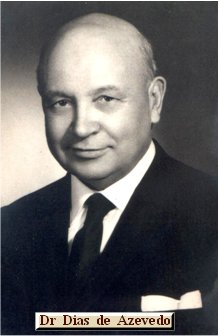 After
praising the director of the Refugee and relating the correspondence he had with
the Archbishop, who advised him to deepen the clinical study, he continues:
After
praising the director of the Refugee and relating the correspondence he had with
the Archbishop, who advised him to deepen the clinical study, he continues:
I went to Porto and I invited a very distinguished doctor to go to Balasar to see Alexandrina (whose illness or malady Dr Gomes de Araújo, on 15th July 1941, had classified as organic paralysis by marrow affection with one or more focuses), telling him that she did not eat. He answered me immediately that he would go to see her whenever I wanted. I told him among others things, that it was an interesting case, since she, apart from not eating, manifested extraordinary phenomena which theologians called ecstasies. At this my friend answered at once that in that event he declined to take on the “case”, since he had no intention of delving into such things.
It did not seem an appropriate response from so beautiful a spirit as he was. As a Catholic, he had an obligation to study the “case”, either to evidence it as an admirable and respectable thing of God, or to expose it as a fraud and prevent people from being deluded. Few doctors were in so felicitous an intellectual condition as he. But things are as they are and, sometimes, as they do not have to be.
Later, I invited Dr Carlos Lima, and this distinguished professor accepted my invitation.
Finally, I invited Dr Gomes de Araújo. I only told him that it was about a patient who did not eat. He also accepted my invitation, but I believe that he was persuaded the patient was a mental anorexic, equal to another case that I had already handed over to him and which he cured very well, or perhaps an hysteric.
I learned shortly afterwards that, somebody in Trofa told him about this case; he had answered that he would like to examine a condition that had eluded me and that, in few days, with the patient kept under observation, all would become clear.
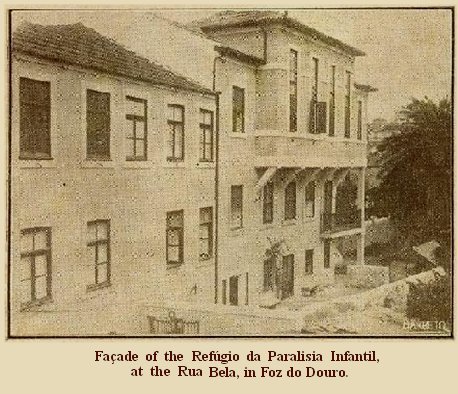
Later Dr Dias de Azevedo continues to talk about Dr Gomes de Araújo:
(…) for the internment, I made him promise me two things: first, there would be a study made of the patient’s mental
faculties, and I wanted to know, in writing, if they were normal or not.
Second, the patient would not be obliged to take food, unless she wanted to, nor was she to be injected with any medication, unless she agreed. Briefly: I wanted it to be understood that if she lived without food and if her mental faculties were normal, she could be interned for as long as was considered necessary: Dr Gomes de Araújo agreed to these conditions.
In the Bulletin of the following July, Dr Dias de Azevedo continues:
It will not overburden our study of Alexandrina to speak about the work that Dr Gomes de Araújo did in order to investigate whether or not Alexandrina did indeed live without even minimum feeding, except the Sacred Eucharist. The authentic purity and fortitude of Alexandrina, which, being all, unfortunately counts for little or nothing with many people. This inquiry is, in a way, more interesting in that it is true, because the very distinguished Dr Gomes de Araújo started with the assumption that Alexandrina was clearly a patient who wished to delude others.
His wife, who has also departed for eternity to receive the reward of her virtues, told me that those 40 days of rigorous inquiry had been a real mental torment for him,. (…)
Fifteen days later, Dr Gomes de Araújo said me, now in his doctor's office:
- You limited me, therefore I committed myself not to force her to eat and I wished to see if she could eat or not.
- But then, Doctor, who was deluded? Was I deluded by her, or were you deluded by me?
We do not want to know if she can swallow food; I know that she can; but, moments later, she vomits it up. I made this experiment from March 1942 until May this year. What I want to prove to the world is that she lives without food or drink.
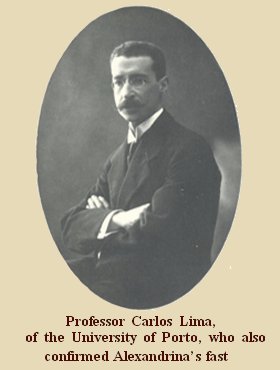 Let
us pass now to the bulletin of August:
Let
us pass now to the bulletin of August:
We affirmed in the previous bulletin - continues Dr Azevedo - that those 40 days of rigorous observation had been a real mental torment for the very distinguished doctor, Gomes de Araújo. It seems me that in this occasion he was convinced that nobody had passed any season of total abstinence of solids and liquids worthy of reference and against the normal process of the physic-chemical exigencies of our organism. These abstinences, of which Christian hagiography speaks, were foreign to his knowledge and conviction which starting with the basic organic law that nobody could live for long periods without eating.
When we presented him with a genuine long-term abstainer, for study and ascertainment, he doubted, as a scientist, its objective reality, and persuaded himself that we hadn’t taken due precautions not to be deluded. It was the proper and safe path for an investigator to follow, and he followed it to the letter, yes, but also with respect, and aware of the consequences of his meticulous study, not allowing himself to be disturbed, while judging the case, with insinuations that anybody made to him (…)
THE LAST DAYS
In the Autobiography, Alexandrina left a detailed story of what she endured during the 40 days she was interned in the Refugee of Foz. Because the first part of this narrative is well known, let’s look at the final part, which also deserves a close reading:
One of the attendants told a doctor who did not know of me, or my case, about what happened to me, which raised new doubts.
This doctor made bold to say that it could not be so, that the attendants allowed themselves to be deceived too easily and that he would only believe it if he used nurses whom he personally trusted.
Dr Araújo, a little infuriated at having his observations discredited, demanded that he, too, would use an attendant who had his confidence. And he chose his sister. When we thought our ordeal was over, we were required to take more tests, more embarrassing and more painful.
Dr Araújo sought to convince us that it was essential to spend ten more days there, however he was totally convinced of the truth, and, against the will of my sister, he insisted that it was necessary for us to remain to convince the other doctor. I answered him: “Who is thirty is forty”. And thus it was decided.
Dr Alvaro, indeed, did not need that much time; it was enough for him, to be convinced, that I only went forty eight hours without eating or defecating, and he did not demand more.
It was the same Dr Araújo who, delicately, for honour of his name, invited the lady (his sister) to stay one more day, and, later, yet another day.
Even after she had fulfilled her mission, this lady came back on occasions to visit me, at last convinced of the truth. This last time was a true Calvary and I offered this great sacrifice to Our Lord and to the heavenly Mother. Hard proof, my God! (…)
They were not slow in tempting me, and watching to see if I took any of their food. When they showed morsels without saying anything to me, I contented myself with smiling at them… And when they offered the food, with inviting words, I showed gratitude: “Thank you very much!”, but always smiling, seeming not to understand their ill intent.
How many times were all my clothes taken off so that I could be examined! (…)
When I saw my sister discouraged – she would appear now and then at the little window in the door asking if I was worse – I would look for ways to encourage her. Poor sister! She heard the doctor’s say that I was being poisoned, because I was not defecating. Poor men! … Jesus knows how to do the things better than they!
The eve of my departure was a day of continual visits. All the children of the Refuge, came to see me and I gave them sweetmeats and I prayed with them for all the house.
My sister felt like a new person now that the ordeal was over and everybody noticed it. I was visited by around one thousand five hundred people… The police had to intervene to keep order. I found one of the police very funny; being charged to keep order, he limited himself to being at my side and there he remained all the time, contenting himself with saying now and then to the people: “Go! Go” (…)
The first thing that I did was to ask that my sister wash me. On the day of our departure, in the morning, the Doctor, who had had almost no sleep because of the responsibility, arrived at the Refugee where many people waited to be able to visit me… and after being a little with me, she left to let some people enter.
It was then that he told us that we could do as we wished and that the observation had finished; he left my sister to eat close to me and said me: “In the month of October I will visit you in Balasar, not as doctor spy, but as friend who esteems you”.
DR DIAS DE AZEVEDO’S LETTER TO THE ARCHBISHOP
Alexandrina’s fast defied science and imposed itself without appeals. But some were not yet convinced or never would be convinced. It was essential to guarantee the truth of everything that involved her, especially the fast. Let us begin by examining this letter written by the parish priest of Chaves to the Archbishop:
Most Reverend Excellency,
I respectfully kiss your ring.
Finding myself here at rest, at the shrine of Sameiro, someone authorizes me to say that the case of Balasar (a certain Alexandrina) is nothing but a vile and indecent fraud that must be extirpated as soon as possible. It is a truly monstrous case from which you must disassociate yourself, and, above all, from which you must remove Fr Pinho. I can say nothing more.
Useless servant.
Fr José Francisco Gonçalves Fraga, Parish priest of Chaves. Sameiro, 30/7/1942[1].
What concrete information could this parish priest of so far away have concerning Alexandrina? What could have convinced him to speak of her to an ecclesiastical authority in terms of “vile and indecent fraud”, of a “truly monstrous case”?
There is an intervention of Fr Agostinho Veloso concerning the period in which Alexandrina was in the Refúgio de Paralisia Infantil[2]. Dr Dias de Azevedo speaks of it to Fr Pinho in a curious letter of 23 August of 1943:
Before having written the report, Dr Araújo was approached by Fr A. Veloso (so creditworthy that he was forbidden to preach in the dioceses of Lamego and Porto), who said that he must not compromise himself because the patient of Balasar is an imposter; to be careful because all is a fraud and that I am a fanatic. I knew about had happened and about what he said … but for what he says concerning me, I forgive him, and I do not want you to suffer because of it: I ask this on my knees. About the statements concerning the patient, someone should be very careful… because there are relatives of such strength that if they knew of the calumny they would break the man´s ribs.
This doctor had many and good reasons to defend Alexandrina. She was not an imposter, her attachment to the truth, her humility and her good-sense did not admit doubts, the supernatural character of what she was experiencing imposed itself on those who were close to her.
In 2nd August 1944, Dr Azevedo wrote to the Archbishop of Braga; Fr Humberto had already come to Balasar, but had not yet assumed Alexandrina’s spiritual direction. The letter is an important document for the clarity of the argument, the greater part of it defending of extraordinary character of her fast.
Most Excellent and Reverend Primate Archbishop,
I received the welcome letter of your Most Excellent Reverence, followed by the opinion of a commission and some resolutions concerning the case of Balasar which has been under scrutiny for such a long time. After reading everything that you have said me, I felt it is my duty to make the following five points to Your Most Excellent Reverence, with the greatest respect and the deepest frankness:
1st Point: I will always keep in my heart the amiable words of the letter of the Primate Archbishop, thanking him for them and declaring myself much obliged;
2nd Point: I will look to have the greatest prudence, if I be provoked to speak or to write about Alexandrina and I will always remember the decision of Your Most Excellent Reverence, so that I be obedient it, as much as possible, save in the freedom to answer to any critic concerning the case, issued in any periodical or magazine of responsibility, therefore I cannot nor do I want to undermine my professional status;
3rd Point: I will continue immovable, until reason or good-sense advises a different attitude to me, in the same position of observation, prudence, clinical inquiry and admiration for Alexandrina, true martyr, that time and God will fully and clearly justify;
4th Point: In accord with the thought of Dr Mazano, Professor of the College of Medicine in Porto who, speaking on this case, and showing that he was very interested in it, said that “there is no possible explanation for not eating for two years”, I continue, as a doctor, without fear of contradiction, to affirm that this case is extraordinary. Because Science says that a woman of 39 years, of healthy intellectual and emotional life, of normal faculties and senses, passing days and nights without sleeping, and sleeping little during the other time, maintaining invariably, or with little variation, the same weight, maintaining normal blood in its constituent elements, living not only forty complete and consecutive days (being monitored day and night to satisfy the incredulous), but two years and three months, the first period completely abstaining from solid and liquid food, including simple water, and the other period in total abstinence of alimentary substances, simply drinking, on an occasional day, under medical imposition, the occasional little spoonful of simple water, with the aim of relieving the dryness of the mouth that she some times felt, constitutes a truly extraordinary fact. It is not necessary, to classify the phenomenon, that doctors have to ask permission of philosophers or theologians to do it with dignity and honesty. To anyone who tells me that there is an opinion of philosophers and theologians who, poaching on disciplines outside their training, claim this fact that has astonished a specialist in neurology is not extraordinary because he does not believe Catholic dogmas, in other words announcing that we must “suspend judgement and wait for a clear explanation which will give us the necessary light”, meaning that Alexandrina’s observation could have been “sure, firm, undisputed, leaving only doubts to those who have the habit of doubting… that is, themselves”, I will answer that who reads both the history and the biography of some extraordinary person, well knows the value of the opinion of each approach. The Church alone wants the truth and I love both the Church and the truth;
5th Point: the Commission, reading this, will judge that this prose is a little tiresome and strained for lovers of philosophy and theology, and I, to alleviate it, ask for license to quote the words of Fr Louis Capalle, S.J., in “Les âmes généreuses”, p. 165 and following :
“La vérité théologique et expérimentale est que Dieu n'a pas donné aux âmes une résistance illimitée, et qu' Il a laissé aux directeurs ou supérieurs imprudents la puissance redoutable d’entraver ou même de ruiner l'œuvre magnifique qu'Il se proposait d’accomplir. Nier cette vérité ou même chercher à l'atténuer par sophismes spécieux, serait atteindre par le fait même la notion de responsabilité, fondement essentiel de toute morale.”
And, after other very interesting phrases, he says: “Malheureusement, après une réponse évidente, on en veut souvent une plus évidente encore; et ainsi on oublie que Dieu, souverainement indépendant, ne se plie pas toujours aux exigences de ses créatures. Il donne assez de lumières pour que l'on puisse raisonnablement conclure à son intervention, et Il laisse assez de ténèbres pour que l'on ait le mérite d’une humble soumission”.
All these phrases can be summarized in short: the determination of Your Excellency is, in general, right even though some words like “pretence” need to be justified; furthermore the opinion of the Commission skirts the facts and denies them the quality of the extraordinary, giving place instead to reckless judgments, which befit neither philosophers nor theologians. I sign off with prayers for the continued health of Your Very Reverend Excellency and ask that this letter be attached to the above-mentioned opinion of the cited Commission (or to the doctors’ report) that pronounced on the great martyr that is Alexandrina of Balasar, whom Msgr. Vilar called his “protectress”, his “providential collaborator”, and “the most faithful co-operator that Jesus gave him”. And he was more trustworthy than an examining commission.
I kiss the sacred hands of Your Very Reverend Excellency.
Manuel Augusto Dias de Azevedo. Ribeirão, 2 August 1944.
[1] Translated from Christo Gesù in Alexandrina, p. 114, note.
The Parish priest of Chaves knew Fr Pinho, and Fr. Pinho was preparing a to go to Chaves to preach. Indeed, he intends to protect Fr Pinho from Alexandrina.
[2] Christo Gesù in Alexandrina, p. 140, note.
The Fr Agostinho Veloso’s opposition to Alexandrina and to Fr Pinho assumes extraordinary dimensions. Somebody said that he was “a madman”. But if so he was “a madman” who published books, and some of real, demonstrable value.
IMPORTANT :
![]()
